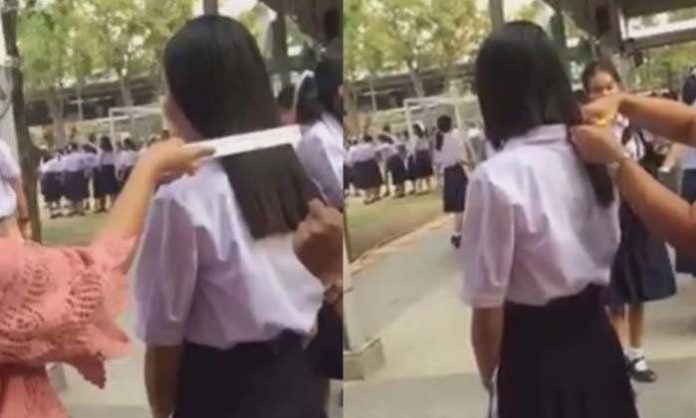Last month, a teacher at a school in Bangkok’s Thung Khru district ordered a teenage student to kneel on the floor, then kicked the boy in the chest and hit his head several times. It was a punishment for playing football in a school building.
Beating up another person is a crime. This teacher should be fired and sent to court. Yet he keeps his job as if nothing happened.
In May, a teacher at a school in Chon Buri province hit a Prathom 4 student’s head with a board wiper. The boy cried in shock when he saw blood running from his head.
In June, a teacher at a school in Udon Thani province slapped her student’s face. According to the parents, these teachers have a long history of violent behaviour with students. Still, they are not punished.
The Education Ministry has long banned corporal punishment, but a month rarely passes without news about teachers hitting children in schools.
However frequent, they are just the tip of the iceberg as most violent incidents go unreported.
According to a study by the Thailand Development Research Institute, about 60% of students say they face corporal punishment in various forms.
Thanks to mobile phones and the internet, video clips of the teachers’ behaviour prevent schools from turning a blind eye. But their responses are largely cosmetic; a committee is set up to investigate the incidents while waiting for media attention to subside.
At best, the abusive teachers are demoted or transferred. They rarely lose their jobs, although the attacks show they are not psychologically qualified to work with children.
Many blame teacher violence on the deep-rooted culture of authoritarianism. Teachers often cite the saying “spare the rod, spoil the child” to justify violence as a disciplinary tool. This is not acceptable.
Abundant research shows how corporal punishment harms students’ learning and emotional health, affecting their self-esteem, education and future. It also hurts the economy. According to Unicef, violence against children affects economic growth by 1.4% to 2.5% of GDP in Asia and the Pacific.
Yet school authoritarianism remains intact because teachers have become the tools of the power structure to indoctrinate obedience in young people, starting with submission to teachers.
But culture is not an island. Authoritarianism thrives in a closed system that can shun rules and laws with impunity. Teachers know they can freely abuse the students because they will not be punished. This unaccountable system must end.
Violent incidents in schools should not be handled as an internal matter by school administrators for mutual protection. Causing physical harm to others is a criminal offence and teacher violence must be treated as such.
Under the law, perpetrators who cause physical or emotional harm to others are subjected to imprisonment and fines. In addition, teacher violence violates the Children’s Protection Act which can entail jail terms and fines for offenders.
So, police must file charges and arrest the perpetrators and send them to court without an out-of-court settlement. The victims and their families can also sue for compensation. When abusive teachers must pay for their crimes with prison and compensation, the culture of impunity will crumble. Consequently, teacher violence against students will drop.
Abusive teachers must also face disciplinary punishment from the Education Ministry. Under the Education Ministry’s rules, teachers can only issue warnings, put students under parole, cut their scores and assign activities to ensure behavioural changes if they want to discipline students.
Rules to end corporal punishment have been in place since 2005. Yet teacher violence remains rife. The education authorities must stop boasting about safe schools policies and start enforcing their rules by punishing the teachers who assault students.
The failure to curb teacher violence also stems from a centralised educational system. At present, schools answer to their superiors based in Bangkok. The Teachers Council in Bangkok has the sole authority to monitor nearly 400,000 teachers nationwide. It simply cannot do the job.
Decentralisation is the answer. Local communities must be able to choose and hire the right teachers for their children. Local communities must be able to decide the pay, monitor teacher performance, and punish rogue teachers. Abuse will drop when schools and teachers are accountable to local communities.
Punish abusive teachers to break the culture of impunity. Hire teachers who respect children’s rights. Decentralise the system to make schools and teachers accountable. This is the way to protect our children.




